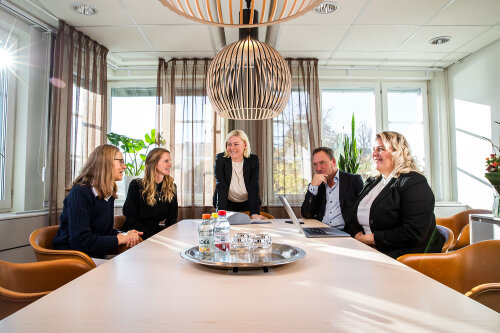Best Collaborative Law Lawyers in Falun
Share your needs with us, get contacted by law firms.
Free. Takes 2 min.
Free Guide to Hiring a Family Lawyer
List of the best lawyers in Falun, Sweden
About Collaborative Law in Falun, Sweden
Collaborative law is an alternative dispute resolution process designed to help parties resolve legal disputes amicably and respectfully, without resorting to traditional court litigation. In Falun, Sweden, collaborative law is especially prominent in family law matters, such as divorce, child custody, and division of property, but may also be used in civil and business contexts. Guided by specially trained collaborative lawyers, both parties commit to a transparent process focused on finding mutually agreeable solutions. This approach prioritizes open communication and cooperation, helping reduce the emotional and financial costs often associated with adversarial court proceedings.
Why You May Need a Lawyer
There are many reasons why individuals and businesses in Falun may seek legal assistance in collaborative law matters, particularly when traditional litigation would be time-consuming, expensive, or emotionally taxing. Common situations include:
- Divorce or separation, especially where children or significant assets are involved
- Negotiating child custody and visitation agreements
- Dividing marital or shared property and finances
- Resolving family conflicts, such as inheritance or support issues
- Business partnership disputes
- Employment relationship disagreements
- Contract negotiation and dispute resolution
A collaborative lawyer acts as both your advisor and a facilitator, working together with the other party's lawyer to achieve outcomes that meet everyone's needs without the adversarial tone of a courtroom.
Local Laws Overview
Falun follows Swedish national law concerning dispute resolution and collaborative processes, with some procedures and resources tailored to the local community. Key aspects include:
- Swedish law encourages out-of-court settlements for family and civil disputes
- The collaborative process requires both parties and their lawyers to sign a participation agreement, committing to resolve the dispute out of court
- If the collaborative process fails, the involved lawyers may not represent their clients in subsequent litigation, maintaining confidentiality and trust
- The process typically includes joint meetings, full disclosure of relevant information, and sometimes other professionals such as financial advisors or child specialists
- Collaborative law does not replace mediation or arbitration, but can work alongside these or as an initial step in dispute resolution
These laws and practices are structured to foster respectful, effective communication and fair results, aligned with Sweden's broader legal principles of equity and proportionality.
Frequently Asked Questions
What types of disputes can be resolved through collaborative law in Falun?
Collaborative law is most common in family law matters such as divorce, parental agreements, and property division, but can also be used for business, employment, and civil disputes where parties seek to avoid court.
Is the collaborative law process confidential?
Yes, the process is confidential. Information shared during collaborative sessions cannot typically be used as evidence if the case proceeds to court.
How do I start the collaborative law process?
You and the other party must both agree to use collaborative law. Each party selects a lawyer trained in collaborative processes, and all sign a participation agreement to commit to resolving the issue out of court.
What happens if an agreement cannot be reached?
If no agreement is reached, the collaborative lawyers must withdraw from the case. The parties are free to seek new representation and pursue litigation if necessary.
Is a collaborative law agreement legally binding?
Yes, once both parties agree and sign a settlement, it becomes a legally binding contract. In family law cases, these agreements can be approved by the Swedish courts if required.
How long does the collaborative law process usually take?
The length varies depending on the complexity of the dispute, the cooperation between parties, and the issues involved, but it is often faster than going through court proceedings.
Is collaborative law less expensive than traditional litigation?
In most cases, collaborative law is less expensive because it promotes efficiency and reduces the time spent on adversarial tactics. There are fewer court fees and streamlined document requirements.
Can collaborative law be used if the parties are not on good terms?
While a minimum willingness to cooperate is necessary, collaborative law is designed to help parties communicate effectively even if relations are strained. Neutral professionals may be involved to help facilitate discussions.
Do I always need a lawyer for collaborative law?
Yes, each party must be represented by their own lawyer who is trained in collaborative law to ensure that both parties’ interests are protected and the process remains balanced and fair.
Where can I find a collaborative lawyer in Falun?
You can contact the local Bar Association, specialized family law firms, or consult online directories for lawyers who list collaborative law as their area of expertise. See the resources section below for more details.
Additional Resources
If you are considering collaborative law in Falun, these resources may be helpful:
- Dalarnas Advokatbyrå - Local law firms with expertise in collaborative and family law
- Swedish Bar Association (Advokatsamfundet) - Find certified collaborative lawyers
- Falu Tingsrätt (Falun District Court) - Information on court approval for family law agreements
- Swedish National Courts Administration (Domstolsverket) - General guidance about dispute resolution
- Local family counseling centers for mediation and support services
Next Steps
If you think collaborative law could be the right approach for your situation in Falun, follow these suggested steps:
- Consider your main goals and whether you are willing to commit to a cooperative process
- Research and contact local lawyers who specialize in collaborative law
- Discuss your circumstances and desired outcomes in an initial consultation with a lawyer
- Invite the other party to participate in the collaborative law process
- If both agree, formally start the process by signing a participation agreement with your respective lawyers
- Engage in joint meetings and work towards a mutually beneficial agreement
- Finalize and, if necessary, submit your agreement for court approval
Collaborative law can provide a respectful, cost-effective path to resolution for people in Falun who prefer to avoid courtroom disputes. With the assistance of trained professionals, you can find solutions tailored to your needs and interests.
Lawzana helps you find the best lawyers and law firms in Falun through a curated and pre-screened list of qualified legal professionals. Our platform offers rankings and detailed profiles of attorneys and law firms, allowing you to compare based on practice areas, including Collaborative Law, experience, and client feedback.
Each profile includes a description of the firm's areas of practice, client reviews, team members and partners, year of establishment, spoken languages, office locations, contact information, social media presence, and any published articles or resources. Most firms on our platform speak English and are experienced in both local and international legal matters.
Get a quote from top-rated law firms in Falun, Sweden — quickly, securely, and without unnecessary hassle.
Disclaimer:
The information provided on this page is for general informational purposes only and does not constitute legal advice. While we strive to ensure the accuracy and relevance of the content, legal information may change over time, and interpretations of the law can vary. You should always consult with a qualified legal professional for advice specific to your situation.
We disclaim all liability for actions taken or not taken based on the content of this page. If you believe any information is incorrect or outdated, please contact us, and we will review and update it where appropriate.










